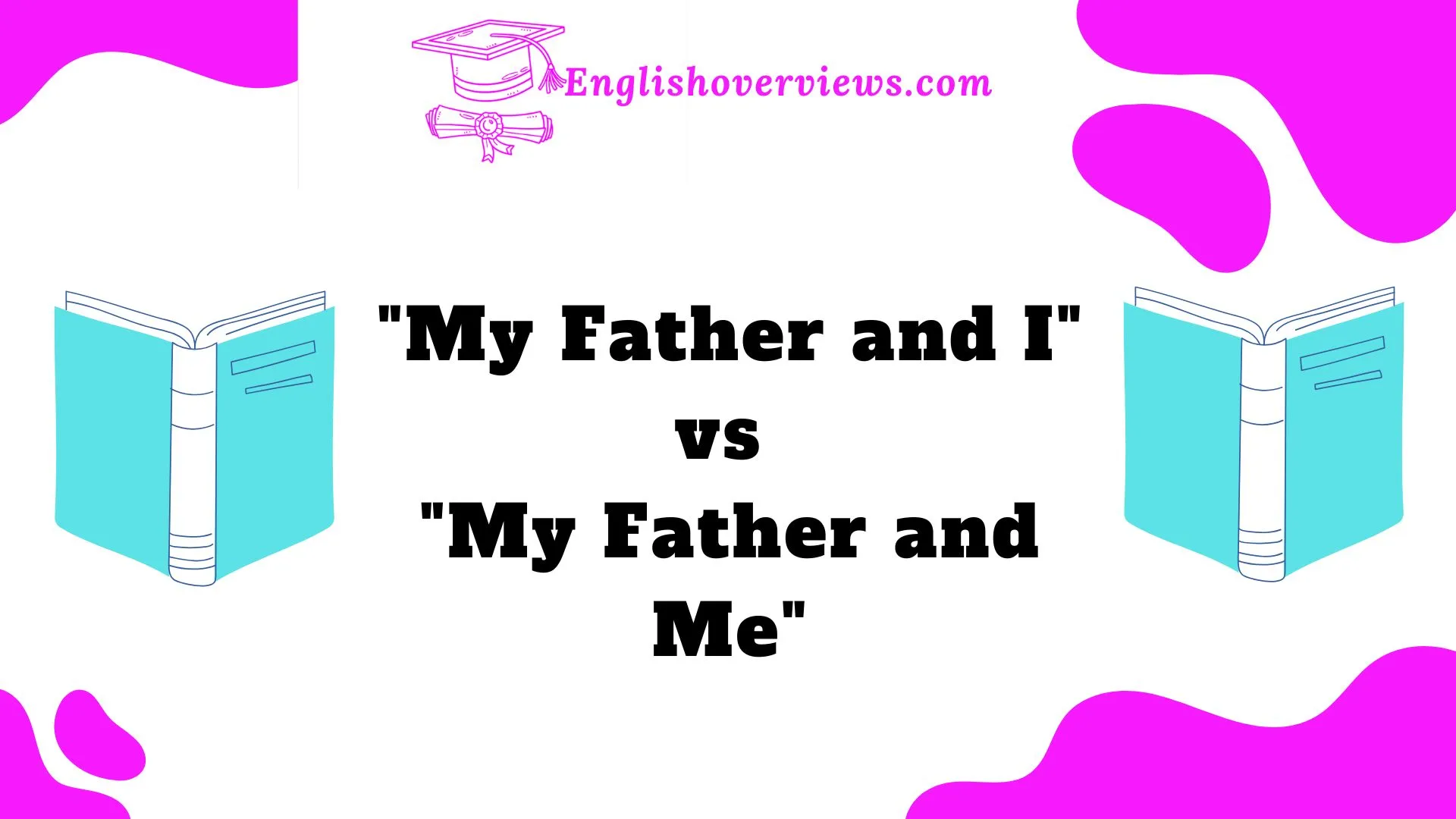Understanding when to use “My Father and I” versus “My Father and Me” can be a tricky challenge for many English speakers. While both phrases are commonly used, knowing which one to choose depends entirely on whether you’re dealing with a subject or object in the sentence.
The confusion arises because many people mix up these two forms without even realizing it, especially in everyday conversation.
In this article, we’ll explore the nuances of subject and object pronouns, give you some simple strategies for choosing the right one, and clear up common mistakes. We’ll also look at the role context plays in deciding which form works best, whether you’re talking about your father or anyone else.
By the end of this post, you’ll understand the correct grammatical rules for using “My Father and I” and “My Father and Me” in all contexts formal and informal.
The Role of Subject and Object Pronouns in English Grammar
Before we dive into the specific cases of “My Father and I” vs. “My Father and Me,” it’s important to understand the basics of subject and object pronouns.
What Are Pronouns?
Pronouns are words used to replace nouns. Instead of repeating the noun over and over, we use pronouns to make sentences flow better and sound more natural. For example:
- I went to the store.
- He gave me a gift.
Subject vs. Object Pronouns
There are two main types of pronouns: subject pronouns and object pronouns.
- Subject pronouns are used when the person or thing is doing the action. For example: I, he, she, we, they.
- Object pronouns are used when the person or thing is receiving the action. For example: me, him, her, us, them.
Subject Pronouns:
- I went to the store.
- We are going to the park.
Object Pronouns:
- He gave me a gift.
- She invited us to her party.
Understanding the Correct Cases: “My Father and I” vs. “My Father and Me”
The case of a pronoun determines its function in a sentence. If the pronoun is the subject, you should use “I.” If the pronoun is the object, you should use “me.”
The Subject Case (I)
When you use “My Father and I,” “I” is in the subject case because it’s part of the subject of the sentence. The subject is who or what is doing the action. For example:
- My Father and I went to the park. (Both you and your father are performing the action going to the park.)
The Object Case (Me)
When you use “My Father and Me,” “me” is in the object case because it’s part of the object of the sentence. The object is who or what is receiving the action. For example:
- The teacher gave my father and me a new book. (The teacher is performing the action giving a book and both you and your father are the recipients of that action.)
When to Properly Use “My Father and I”
So, when do you use “My Father and I”? The key here is that I is used when you’re talking about the subject of the sentence who is performing the action.
Correct Usage in Compound Subjects
Use “My Father and I” when both people are doing something in the sentence, as the subject. For example:
- My Father and I went to the movie last night.
- My Father and I will travel to the UAE next summer.
In these sentences, My Father and I are the subjects who are performing the action of going to the movie and traveling.
Examples:
- My Father and I attended the wedding. (Both of you attended.)
- My Father and I love playing chess. (Both of you are doing the action.)
Tip:
If you remove “My Father and” and the sentence still sounds correct, then “I” is likely the correct choice.
- I went to the movie.
- I love playing chess.
Appropriate Usage of “My Father and Me”
On the other hand, “My Father and Me” is used when the pronoun is the object of the sentence the receiver of the action.
Correct Usage in Object Position
You use “Me” when the pronoun is acting as the object of a verb or preposition.
For example:
- The teacher gave my father and me a new book.
- They invited my father and me to dinner.
In these examples, you and your father are the recipients of the action the book is being given to you, and you’re being invited to dinner.
Examples:
- She brought gifts for my father and me.
- They made dinner for my father and me.
Polishing Your Grammar: Simple Tips for Remembering the Rules
If you find yourself forgetting when to use I versus me, don’t worry! There are a few simple tricks that can help you remember.
Test with Removal
One of the easiest ways to figure out which form to use is to remove “My Father and” from the sentence. If the sentence still makes sense, you’ll know which pronoun to use.
- Example 1: “My Father and I went to the park.”
Remove “My Father” and “I went to the park.” (Sounds right!)
So, I am correct. - Example 2: “The gift was for my father and me.”
Remove “my father and” “The gift was for me.” (Sounds right!)
So, me is correct.
Using Coordinating Conjunctions
When “and” is used to connect two subjects or objects, both pronouns (whether “I” or “me”) should match in case.
Common Misconceptions and Correcting Common Errors
Many people make common mistakes when choosing between “I” and “me.” Let’s clear up some of the misconceptions:
Also Read: Giving or Given? Understanding When to Use Each (With Examples)
1. “I” is Always Right
Many people mistakenly think that I is always correct, regardless of whether it’s the subject or object. This is incorrect!
- Example Mistake: “Me and my father went to the park.”
This is incorrect because me is used in the subject position. The correct sentence should be: “My Father and I went to the park.”
2. “Me” Should Always Come Last
Another common mistake is thinking that “me” should always come last in a sentence, which isn’t always true. The phrase “My Father and I” is the correct structure when both people are doing something, and “My Father and Me” is the correct choice when you’re the object.
Why “Me and My Father” Is Often Misused
Many people use “Me and my father” because it feels more casual or natural in everyday conversation. However, this is grammatically incorrect in formal contexts.
Influence of Informal Speech
In informal speech, it’s common for people to say things like, “Me and my father went to the store,” but this is a grammatical error in formal writing.
Fixing the Habit
To avoid this mistake, always ask yourself whether you’re the subject or the object of the sentence. If you’re performing the action, use I. If you’re receiving the action, use me.
The Role of Context in Choosing ‘I’ or ‘Me’ with Family References
Context plays a huge role in choosing between “I” and “me” with family references.
The Contextual Clue
- In informal conversations, using “Me and my father” might seem fine, but it’s better to use “My father and I” for clarity and correctness.
- In formal writing, always use “My Father and I” for subject cases and “My Father and Me” for object cases.
Conclusion: Mastering the Art of Correct Pronoun Use
By now, you should have a clearer understanding of when to use “My Father and I” versus “My Father and Me.” Remember:
- Use I when you are part of the subject doing the action.
- Use me when you are part of the object receiving the action.
With a little practice and attention to detail, you can avoid these common errors and speak and write more clearly and confidently.
FAQs
1. Why is “My Father and Me” incorrect in some sentences?
Answer: “My Father and Me” is incorrect when used as the subject of a sentence. “Me” should only be used as the object.
2. Can I say “Me and my father” in informal speech?
Answer: Yes, but it’s grammatically incorrect for formal writing. Always use “My Father and I” in formal contexts.
3. How do I remember when to use “I” vs. “Me”?
Answer: Use I when you’re the subject (performing the action) and me when you’re the object (receiving the action).

Alyan Ashraf is the creative mind behind English Overviews, a platform dedicated to helping learners master the English language. Passionate about education and language development, Alyan specializes in simplifying complex English concepts, making learning accessible for students of all levels.











